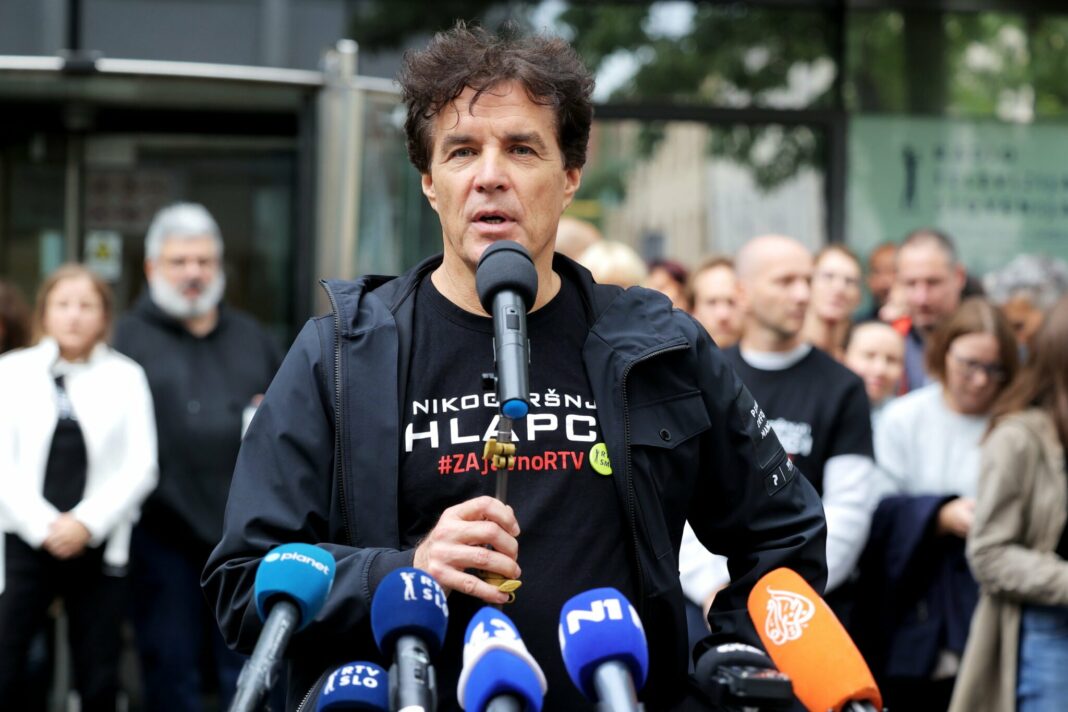By: N. Ž. (nova24tv.si)
After the recent unanimous decision by the RTVS Council that one of the most disruptive elements on public television, Uroš Urbanija, must leave the position of acting director of Television Slovenia, it seems that a new front has opened up after the so-called “depoliticisation” of the public media, which will be directed against the remaining disruptive elements. The new RTVS management has declared the collective agreement, which protects employees from transfers and dismissals, null and void.
“Just now: the new management of RTV Slovenia has declared the collective agreement that protects employees from transfers and dismissals null and void?! Which is probably illegal, but now they have a free hand for a personnel massacre,” revealed long-time journalist Bojan Požar via Twitter, along with the content of the notice from the new management, which, at its 2nd regular session on August 22nd, was informed about the contents of the Collective Agreement signed on July 13th this year by the former acting General Director of RTV Slovenia, Andrej Grah Whatmough, and the President of the Trade Union of Radio Slovenia Workers, Tom Zalaznik.
The notice shows that the management unanimously adopted a resolution regarding the Collective Agreement, which was published in the Official Gazette of the Republic of Slovenia on July 21st this year, declaring it null and void. They explained that “the signing of the Collective Agreement exceeded the legal authority of the then leadership of the public institution RTV Slovenia or acting General Director Andrej Grah Whatmough”. As stated by the newly elected management, they will “continue with social dialogue with representatives of representative trade unions and other social partners in the future and strive for better working conditions for all employees”.
In light of the recent personnel changes in leadership, many are wondering if this signifies the beginning of a reshuffling among those who are not among those who are f***ing more. This is particularly relevant in the context of recent events when uniformed police officers were searching for a long-time journalist at RTV Slovenia and historian Dr Jože Možina. Možina criticised these actions, stating, “Is this called intimidation, political pressure on journalists, a path to dictatorship, an attack on freedom of speech … or is there another term for it? Is this the new standard of FREEDOM at RTV Slovenia?” The police maintain that this was not intended as intimidation, political pressure, or similar, but merely the routine performance of police duties. Regarding Možina’s post, they claimed it was an attempt to pressure the police officers. Možina emphasised that it is clear that this is a political story and asserted that he will not be intimidated in any way.
During the previous government, it would have led to a press conference, and Commissioner Jourová would have visited Slovenia
If such an incident, like the one involving Možina, had occurred during the time of the previous government to any of the journalists who passionately supported the government’s efforts to politicise the public broadcaster, it would have been widely discussed by politicians, including the mainstream media. However, now there is silence. The new management has not issued criticism in this particular case, leading many to reasonably suspect their tacit approval of the police’s actions. Interestingly, even journalists who fervently advocated for press freedom during the previous government did not express support for Možina. Similarly, during the previous government’s time, the decision recently made by the new management regarding the Collective Agreement would have been widely criticised. The leadership would have been accused of clearly paving the way for personnel changes. In response to all of this, a press conference would probably have been convened, and politicians from the left would express their shock. It might even have led to a strike by journalists, or perhaps there would have been studio disruptions as a form of protest. Furthermore, Brussels would have been informed about these events. Vice-President of the European Commission, Vera Jourová, would have been notified, and she would not have held back from expressing her concerned warnings during a press conference on media freedom. Most likely, she would have announced her visit to Slovenia as well. However, Jourová is now strangely silent and unconcerned. This is how it goes when it comes to the “liberation” of the public broadcaster, which should otherwise represent the television for all citizens, regardless of their political beliefs or any other convictions. The criteria are now entirely different, and criticism of the majority’s opinion is entirely unwelcome.

